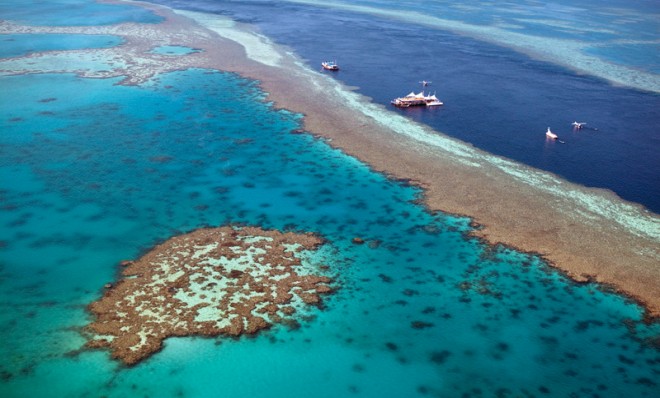Oops: The U.S. Navy accidentally lost four bombs over Australia's Great Barrier Reef
"Have we gone completely mad?"

A free daily email with the biggest news stories of the day – and the best features from TheWeek.com
You are now subscribed
Your newsletter sign-up was successful
Some things are made to be lost. Your house keys, naturally. Perhaps your phone, on an irresponsible night spent consuming an alcoholic beverage or several.
But far, far, far down the list of things that should never, ever accidentally be misplaced are weapons of mass destruction. And yet that's exactly what happened when the American military accidentally dropped four bombs — well, two real bombs and two dummies — just off Australia's northeastern coast early last week.
Worse still is that the unexploded payloads landed in the Great Barrier Reef, the world's largest (and most fragile) coral reef ecosystem.
The Week
Escape your echo chamber. Get the facts behind the news, plus analysis from multiple perspectives.

Sign up for The Week's Free Newsletters
From our morning news briefing to a weekly Good News Newsletter, get the best of The Week delivered directly to your inbox.
From our morning news briefing to a weekly Good News Newsletter, get the best of The Week delivered directly to your inbox.
Oops is right.
According to the Associated Press, two of the Navy's AV-8B Harrier jets each jettisoned "an inert practice bomb" and "an unarmed laser-guided explosive bomb into the World Heritage-listed marine park off the coast of Queensland state" last Tuesday. The U.S.'s 7th Fleet issued an announcement about the incident just this weekend.
The bomb drops allegedly happened on the second day of Talisman Saber, which according to National Geographic is a "biennial military joint training exercise between Australia and the U.S":
Felicity Wishart of the Australian Marine Conservation Society (AMCS) said she would like to see an end to such exercises in and around near the reef. "It's not just the bombs. It's all the ship movement and aircraft noise," she said. "All of these things are not a normal part of that particular environment." [National Geographic]
In addition to the world's largest coral network, stretching for 1,250 miles along Australia's coast, the Great Barrier Reef is teeming with marine life, including whales, sea turtles, manatees, 215 species of birds, and more than 1,500 species of fish. In fact, the ecosystem plays host to so many endangered species that the Great Barrier Reef Marine Park Authority (GBRMPA) increased the amount of highly protected zones by nearly 30 percent just in 2004.
A free daily email with the biggest news stories of the day – and the best features from TheWeek.com
"Have we gone completely mad?" Australian Senator Larissa Waters told the Australian Broadcasting Corp. "Is this how we look after our World Heritage area now? Letting a foreign power drop bombs on it?"
As expected, the U.S. Navy is trying to downplay the threat of the bombs, which altogether weigh 2,000 pounds. "There is minimal environmental impact," Commander William Marks, a spokesman for the U.S. 7th Fleet, told Australian Broadcasting Corp. radio on Monday. "It is a safe situation for the environment, for shipping, for navigation." According to the Navy, the pilots were forced to execute the emergency drop because their jets were low on fuel and couldn't land with their payload. The jettison area was chosen so as not to interfere with possible shipping lanes.
To its credit, the U.S. has offered to help recover the unexploded bombs, at least should the Australian government request it. "If the park service and the government agencies of Australia determine that they want those recovered, then we will coordinate with them on that recovery process," a spokesman told the BBC.
Good to know.
-
 The ‘ravenous’ demand for Cornish minerals
The ‘ravenous’ demand for Cornish mineralsUnder the Radar Growing need for critical minerals to power tech has intensified ‘appetite’ for lithium, which could be a ‘huge boon’ for local economy
-
 Why are election experts taking Trump’s midterm threats seriously?
Why are election experts taking Trump’s midterm threats seriously?IN THE SPOTLIGHT As the president muses about polling place deployments and a centralized electoral system aimed at one-party control, lawmakers are taking this administration at its word
-
 ‘Restaurateurs have become millionaires’
‘Restaurateurs have become millionaires’Instant Opinion Opinion, comment and editorials of the day